|
|
 |
 |
|
WATCH TWO PARROT HEALTH FOOD WACKOS IN ACTION ON YOUTUBE

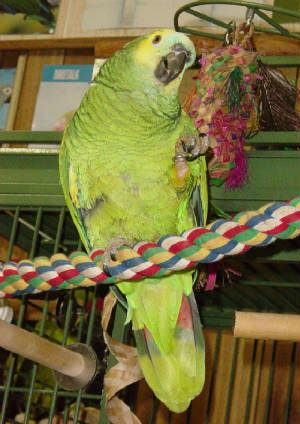
|
| ZIGGY ON HIS ROPE PERCH |
Ziggy's "formal" name is Zigothy T. McParrot, the "T" standing
for trouble, of course!
Ziggy is a blue-fronted Amazon. My mother bought him on September
28, 1985. He had been advertised as being about 22 to 24 months old at the time, so he was probably born in late
1983, which would have made him a fine young gentleman! I had thought that I might predecease him, and originally
created this website with the intent of helping out his new companion human in dealing with him because he did have
some "issues," such as attacking and grabbing any white cloth that comes near him. (More information can be
found on this site at the psychology of Ziggy.)
I obtained Ziggy from
my mother in December, 2000, after my father's death. I didn't think I'd be able to take care of him properly then, since
I was working, and I wasn't intimately familiar with parrots, but she insisted, and I obliged.
My
mother had been quite elderly, and he'd attacked her, biting her neck and causing a number of nasty cuts. Considering
her age and the sharpness of his beak, she's lucky he didn't sever her carotid artery: that would not have been a pleasant
outcome. She thought that the attack was the result of his anger at having been boarded for a few days while she and
I had to attend my father's funeral. She had to have been at least partly right: where he was boarded was at a pet
store, whose owner boarded pets on the side. Ziggy wasn't able to get out all that time, and, worse, he was back in a pet
store, which most likely brought back very bad memories. Parrots have better memories than elephants. He had been purchased
and returned at least twice at the original store where my mother bought him, so he might have felt more abandoned
than a parrot normally would when its humans "vanish."
I
later wondered if another provoking factor might have been that he blamed her for my father's death. He would have seen
her kneeling over and around my father as he lay dying, after having yelled for help: Ziggy had been out at the time, and
he preferred my father. In addition, my mother had another bird, Buddy the First, who was her favorite, and she did not treat
the birds equally. Ziggy was in the cage most of the time, while Buddy was out, and birds are not idiots. So Ziggy was bound
to have had several reasons, in his mind, to attack my mother.
Regardless,
I obtained him, and tried to care for him. He had been diagnosed
with fatty liver disease in the early 1990s. He had also been a feather picker. The original vets thought that his picking
was due to allergies, specifically probably tobacco, since my mother smoked, and his original "prescription" for that was
Benadryl in his water. (That may account for his eventual aversion to drinking water.)
My
mother forbade me from allowing any vet to draw his blood. Although she had always used legitimate veterinary services for
her animals, when it came to birds, she had two problems with them. One is that she had observed that there are many more
quacks in the veterinary profession than there are in the medical profession, and she could not stand quackery. (She wasn't
saying that they are all quacks, merely that there is a greater likelihood of any one of them being a quack.)
Another
major issue that imbued in her the no-vet rule was that, long ago, a vet had tried to trim Ziggy's beak, and, in the process, had
nipped poor Ziggy's tongue, which caused trauma and obviously great pain. Ziggy never forgot how "evil" vets were.
In
addition, although my mother did not like the toenail blood drawing process (which is how they used to get blood)
at all, she was even more horrified about their then-new process of getting it from the birds' jugular veins.
With that, I can sympathize: my mother had had literally dozens and dozens of blood tests in her life, as have I, and she had
discovered long ago that human phlebotomists are sometimes totally incompetent. I've discovered the same thing, and,
alas, it seems to be getting worse; apparently, to be a phlebotomist these days, you have to be blind in both eyes and
have Parkinson's to boot. (Yes, I know, there do exist some who are competent. I can think of one or two who'd be able to
get blood out of a paramecium.☺)
Knowing
that the person drawing the blood might mess up the vein, you naturally fear for your bird's life. There are too
many anecdotal stories about birds dying during and immediately after blood draws for it to be coincidence.
If supposedly trained human beings can be so incompetent that,
with some of them, such as on two successive occasions with me not long ago, I
find it difficult to believe that they could have been capable of getting water
out of a faucet, let alone blood out of a vein, how in the world could one
expect a vet to be successful in not ruining a vein? Consider that the vet
presumably has less training in phlebotomy than a phlebotomist, and consider
that the patient is a bird who's desperately trying to escape the clutches of
that non-flock member human, a “creature” who is obviously a predator intent on
getting ready to eat the bird. Remember, our birds are prey animals. (Actually,
I'm sure that vets are better than human phlebotomists, since success in
drawing blood is really more a question of intelligence than training.)
Anyway, Ziggy could not have any blood drawn unless it was a life or death emergency: mother's
orders.
In late
2009, what the vet diagnosed as being a result of Ziggy's
long-standing liver issues manifested itself: he began having whole body spasms, and I took him to a veterinary clinic, where
a blood draw and, later, an ultrasound, revealed an enlarged liver and high blood liver enzyme results. My mother had passed
away, and could not object to me having had his blood drawn. (In retrospect, I find it likely that his initial seizures were
less the result of his liver problem than an undiagnosed cerebral/cerebrovascular problem that would end up causing syncope.)
He was prescribed lactulose, and, because of two areas of "altered
echo texture" in the ultrasound image, the vet wanted to do a biopsy. That, I refused. I'd had liver issues myself since 1963,
and had refused the same thing on me. There were two main reasons in both cases. One is, if a tumor is there, the possibility
exists--and this is well-documented--that when you puncture the tumor to get the sample for biopsy, little "seedlings" of
it are left along the path of the needle, a process called needle-tract implantation. The
other main reason was that of pain. In humans, "nearly 30% of patients report having substantial pain after
liver biopsy, and some experience serious complications such as pneumothorax, bleeding, or puncture of the biliary tree. In
rare cases, patients die of bleeding."
I opted for what is termed "empirical therapy," which, judging by the fact that, over the next several years,
his liver enzymes approached normal and the ultrasound image of his liver was improved, must have been working.
If that had not worked, I would likely have let them do a
biopsy, but what I tried to do, unsuccessfully, was try to find a facility that uses enhanced ultrasound techniques. The world
of medicine keeps changing, and there are new methods of doing ultrasound that are so definitive, so precise, that they can
obviate the need for other forms of testing. MRE imaging--Magnetic Resonance Elastography--was approved in 2009 for human use on the liver. Alas, I couldn't find it being used yet on birds, although logic
would dictate that there must be an advanced veterinary college somewhere that would have been investigating it, but I was
unable to gain any cooperation from the veterinarians in question as far as trying to find a facility using or testing the
new technology--although I told them that I would drive anywhere in the nation with Ziggy if I could find such a place.
Ziggy passed away on February 7, 2014, not of
liver issues, but, apparently, of cardiovascular ones. His murder occurred at a vet's office, on an emergency visit, after
having his blood drawn, when I had taken him there late that evening because he seemed to have sudden weakness, almost collapsing
in his seed cup after flying over there.
I
never did get a complete necropsy report, despite repeated requests, and I must say that I violated one of the cardinal rules
of medicine in that respect: never get a necropsy done at the place where your animal dies, for obvious reasons. I had one
very simple question, for instance: what, in his liver, showed up where the areas of "altered echo texture"
were? That's not a difficult question to answer, and anyone with the slightest modicum of intellectual curiosity would have
wanted to know. The fact that the institution in question failed to answer that question--despite being repeatedly asked--leads
me to conclude that they were covering up malpractice, may their souls reside in hell.
Let me point out that, because of the obvious stress of being at a vet's office--even more so in his case
because of his history--and the difficulty of obtaining a good blood draw on a wiggling patient, like many other bird owners,
I had made it a standard practice to have them sedate him before a blood draw, with, in his case, midazolam. Now you
have to think. Put on your thinking cap. What I'm about to point out did not occur to me at the time, but it certainly should
have occurred to a supposedly trained professional. You have a patient come in, and, in his case, that patient's symptom is
syncope--a term I'd never heard before, but which turns out to be a glorified word for fainting. Now think. Would you sedate
someone (or some animal) who is fainting? That sounds crazy to me. What, in retrospect, he needed, was to be admitted to their
hospital and placed in an oxygen tent, to await the arrival the next morning of an actual avian specialist. I can see that
some situations could exist in which a patient with syncope might need to be sedated, such as for surgery: but, if you did
so, you would have an expert do it, and you would be extraordinarily careful in the process--and in the choice of a sedating
agent.
Anyway, at the same time as they
had informed me previously that his liver function was improving, they had also diagnosed his cardiovascular system as
looking good also, at least on the ultrasound. However, after his death, I was informed that his heart was enlarged, and the
conditions of his blood vessels seemed to indicate enough hardening of the arteries to keep him from being able to pump enough
blood to his brain, which caused syncope (a physician's term for fainting, or woozy spells), which was the occasion
for that final vet visit.
I felt blindsided
by that diagnosis because I'd been told that his health was improving. I was also blindsided because I then discovered that,
during the couple of years prior to his death, there had been important, serious literature reports of cardiovascular diseases
in parrots, especially Amazons. I believe that competent avian veterinarians, upon seeing Beaufrere's publications on that
subject, would have informed all their avian patient owners of just how serious and widespread the problem is. In my
case, the vet didn't even seem to be aware of Beaufrere. I was impressed enough by the studies that I then subscribed to one
of the journals that publishes his work, Journal of Exotic Pet Medicine, to help support the dissemination of such work. (Boy, you learn a lot of
things from that journal, such as how a vet examines rattlesnakes, and the husbandry of centipedes.)
Had
I known Ziggy's problem was that bad, there are a couple of things I would have done that might have helped.
Actually, the medical misadventures, upon analysis, show much
more of a problem than I've described here. First of all, in about 2001 or 2002, I'd observed Ziggy crying out in pain--giving
out an awful squawk--when there was nothing around to be causing pain. This was very rare, and did not occur when he was preening
or picking at a feather or anything like that. It had nothing to do with molting. One time it happened when he was right next
to my hand, and had been sitting there snoozing, and he bit me. He obviously thought I had done something. (That should give
you some insight into the parrot mind: He'd just had a pain, I was right there, there was nothing around
him except for me to have caused it, therefore I must have done it.) My thinking was that it had to be angina, or gout,
or some other type of pain such as what you or I might have. But, oh no, although I mentioned that to the vet, several times--and
remember, this symptom would only occur once a year, if that--to the vet's "mind," it was explained by the magic words,
"blood feathers." Well, yes, when a bird is molting and has new feathers coming in, there can be some pain, especially if
those feathers get rubbed the wrong way. But I'd seen the bird through numerous molting seasons, and never saw anything like
that, so my assumption--which, in the light of his eventual demise--turned out to be correct. It had to have been angina.
But wait, it gets worse. I mentioned feather picking. Now, you
know that a common "idol of the mind" is that we humans tend to look for some "the" cause for events, and that this "the"
cause has to be simple. Also, once we have decided on an explanation for something, facts are unlikely to get in the way later
on. I fully understand that feather picking is at least partly behavioral, and is usually mainly behavioral, i.e., there's
no "physical" cause.
However, someone who has
a mind would look for other causes besides pure behavior. If I start itching and scratching a lot, I don't go see a psychologist.
The most obvious thing to look at would be the air quality. What is in the air? Are there mold spores? If it were me, I would
get a sample of whatever's in the air, and examine it microscopically, just to see. There might be black mold spores, there
might be the bird's own dander, there might even be dust mites. I had severe allergies during childhood, and one, to dust
mites (called just "house dust" during my childhood) has returned. If I can start having an allergic reaction to something
like that, is it not possible that a bird might also? But try to get most vets to consider something like that and you may
as well talk to a brick wall.
His problem puzzled
me. I even took samples of various substances--such as the "chewable" perch, made in China--to get analyzed, out of worry
that, maybe, his problem was due to some kind of contamination. I was grasping at straws looking for a solution, but I never
considered the possibility that it might be his cardiovascular system.
In addition, there was the problem of anxiety. The behavioral aspect of feather picking is related to anxiety.
Ziggy had stopped feather picking not long after I got him, but, the last couple of years, had started again. There do exist
powerful anti-anxiety medicines, but the vet, although she recognized that the bird was anxious, refused to prescribe any
of them because of his liver problem. I have found one possible alternative: See this 2003 meta-analysis of one possible medical substance.
What
I now think is that he was suffering from syncope long before I noticed it, and that the syncope was a consequence of his
cardiovascular problem. One time I had left my Houston residence while he was asleep, and out, and, when I came back, his
room was still dark, but he had done something in the dark during which he ended up clutching to a drape. I assumed that something
had scared him. On a couple of occasions, a mouse had gained entry, and I assumed that that was the problem. At the same time,
he was becoming more and more insistent on wanting to sleep near my bed instead of on a perch in the upper corner of the room.
I now think that that was because he was scared of falling off. And just a few days before he died, he'd gone flying off in
the dark, and clobbered himself against a wall. I again assumed that something had scared him, and even set up a motion-activated
trailcam to see if there was something. I did find a large moth that showed up, and I wondered if he might have been disturbed
by something like that. It made sense, but I now think that syncope was the explanation.
But, you see, I never considered that there might be a cardiovascular problem. I didn't know about all that
recent work, which included scientific literature on the results of necropsies of hundreds of parrots. I'd heard about them
getting cardiovascular disease, but Ziggy was "only" in his 30s, and I never even considered the idea. And the vet blamed
his renewed feather picking on his liver (despite the improvement in liver function.) Once you have a "the" cause for something
in your mind (or a diagnosis), it tends to remain intact, regardless of what facts may subsequently emerge. This is called
tunnel vision, and is one of what Francis Bacon referred to as idols of the mind.
And, at that particular vet, another thing occurred that, looking at it later, should have caused me to
change vets. You should be aware that no sane person, knowing what it is, would use homeopathic so-called "medicine." I can
understand how someone, having, say, heard from another person that it seemed to work for something or other, might give it
some temporary credulity. But when you look at what it is, you could not possibly take it seriously. I joke about homeopathy
all the time, because all it is is glorified black magic. The premise of it is that it doesn't matter what causes a disease
or condition, the only thing that matters are its symptoms, and, by some grand coincidence in the way the universe is constructed,
if you administer a virtually infinitely dilute solution or mixture of something-or-other that causes the same symptoms as
a particular disease, that will magically cure the disease. It's actually a sort of magical energy kind of lunacy: most of
their "remedies" don't contain measurable amounts of any active ingredient. Naturally, as I said, I joke about it all the
time. At that vet's office, I'd made such a joke and a veterinary assistant seemed to react in a manner that indicated that
she believed in homeopathy. Well, let me tell you something: if a medical or veterinary professional believes in homeopathy,
get as far away as possible, since that belief proves that their minds don't work properly. In that case, I'd mentioned to
the vet in question that her assistant seemed to believe in homeopathy, whereupon the vet herself made a comment which, at
the time, I took to be satirical, but, now, in the blackness of having trusted someone who should never have been trusted,
indicated that she, too, was a believer in woo. I should have changed vets, right then and there, but I had another overriding
concern, the safety of my premises, since both my house and the house I'd inherited had been burglarized, and I now realize
that I was a little obsessed with worrying about security.
CLICK HERE FOR VIDEO OF ZIGGY AND BUDDY BREAKING BREAD WITH ME
| A GOODY FELL UNDER THE GRATE OF HIS TRAVEL CAGE |
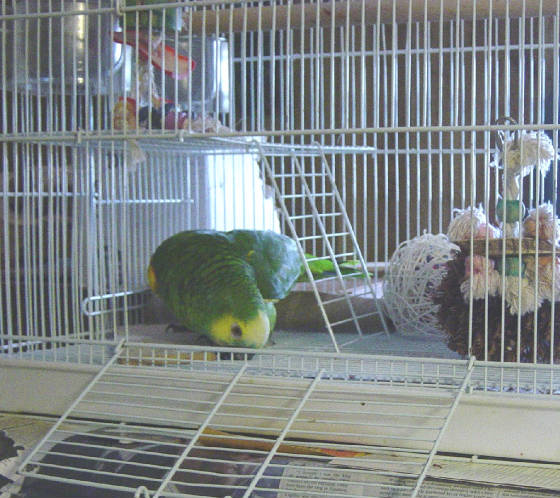
|
| ZIGGY'S BEEN KNOWN TO CURSE WHEN HE CAN'T REACH THE GOODY |
YES, PARROTS ARE SENTIENT
Ziggy is free-flying. He has not had his feathers clipped since he was in the original pet store
in 1985. My mother was a birder, and could never stand for wing clipping. Alas, I have had to go against
my own beliefs with our newer bird, Buddy, at least for the present. At the vet's suggestion, for Ziggy's protection, I have
had Buddy's wings clipped: it was my vet's belief--and I concur--that, for Buddy to be completely free-flying would be a physical
danger to Ziggy, because of Buddy's aggressiveness. Ziggy had to visit the vet once to take care of some foot wounds
because of Sir. Savage's sharp beak. To my mother's extremism, I add my own brand of extremism:
to me, a birdcage is a prison.
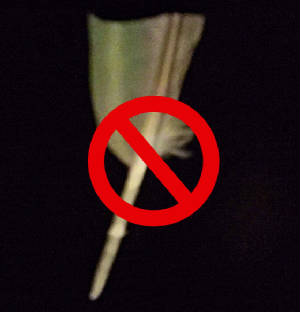
I had never thought about cages one way or the other until one day, shortly after I
got him, I realized just how intelligent he is. He was on my shoulder while I was walking around the kitchen
trying to decide what to have for breakfast. I wasn't expecting an actual answer when I asked him, "What are we going
to have for breakfast?" I did a double take when he replied, "Yum yum good egg." You cannot tell me that was mimicry:
that was a specific answer to a specific question. I have only heard him use that phrase once since.
It is unthinkable to imprison a sentient being like him. The only time he is caged
now is when we are traveling or, sometimes, when there are visitors. (He is jealous, and won't allow anyone to get
close to me.) I don't cage him when I'm gone: his room--which doubles as my bedroom--has thick plastic and other barriers
to protect electrical outlets, etc.
Actually, my extremism goes further than just viewing
cages as prisons: I believe that all creatures are endowed by their
creator with certain inalienable rights, and the extent of those rights is a function of how sentient a particular creature
is.
I am not using the term sentient in the philosophical
sense or in the sense that animal rights advocates use it; I use it in what the Wikipedia article on sentience describes as the science fiction usage--it implies qualities such as "will, desire, consciousness,
ethics, personality, intelligence, insight, and so on." Ziggy is not much of an animal rights advocate; he is perfectly willing
(and happy) to eat his cousins--chickens--as well as their unborn progeny. He occasionally gets fed a wing bone or two
to chomp; he prefers drumsticks, but I don't like the way drumstick bones splinter. I, too, make no apologies for my biological
heritage of being an omnivore, so please, PETA, no emails about the evils of eating meat.
[Note: I try not to expose my birds to human pathogens,
which means that they cannot handle anything that has been in my mouth. To give them bones, I manually slice the meat off
with a paring knife, and then rinse the bones with warm tap water to remove any remaining salty, greasy meat
or skin. I leave cartilaginous fragments on, since those have some nutritional benefit.]
The recognition of animal sentience is built into many
laws, including that of the European Union, although the EU uses the term in a more general sense than I do:
In 1997 the concept of animal sentience was written into
the basic law of the European Union. The legally-binding Protocol annexed to the Treaty of Amsterdam recognises that animals
are ‘sentient beings’, and requires the EU and its Member States to ‘pay full regard to the welfare requirements
of animals.’ [This quote appears verbatim in so many places, including Wikipedia, that I do not know to whom to
give credit.]
Spain extends legal rights, including protection against being
tortured or killed--and even exploitation for profit--to apes, but bullfighting remains legal. Worse, they kill wild parrots
in Barcelona. (Electric companies have been known to kill wild parrots in a number of American cities
also.) I cannot fathom how anyone could kill or eat intelligent beings such as whales, gorillas,
dolphins, or, most certainly, parrots.
Laws are more extreme
in Switzerland. The Swiss modified their constitution recently to make sure their citizens respect "the dignity of creation
when handling animals, plants and other organisms." Their Federal Ethics Committee on Non-Human Biotechnology concluded that,
"decapitation of wild flowers at the roadside without rational reason" is criminal, and that it is morally impermissible
to cause "arbitrary harm" to plants. Maybe there's a little bit of Buddhist in me because I have always been disgusted at
people who would kill or destroy any life, including plants, for no reason, but the Swiss law is a little extreme.
Since Sept 1,
2008, even goldfish there have been protected against physical and psychological abuse. Aquariums must allow fish to
live in a natural day/night cycles. They've created rigorous standards for how all social animals are treated. According
to the Houston Chronicle, "the country's 160-page animal protection law states exactly how much space owners must give Mongolian
gerbils (233 square inches) and what water temperature is required for African clawed frogs (18-22 degrees Celsius; 64-72° degrees Fahrenheit)." If you
want to see all the teabaggers having to be sent to emergency rooms due to sudden apoplexy resulting from fits of anger, just
try suggesting that here.
Switzerland's
canton of Zurich requires that all animals have an attorney, and he is Mr. Antoine F. Goetschel. But in a
March, 2010, election, voters nationwide rejected a move that would have extended that requirement to the entire nation.
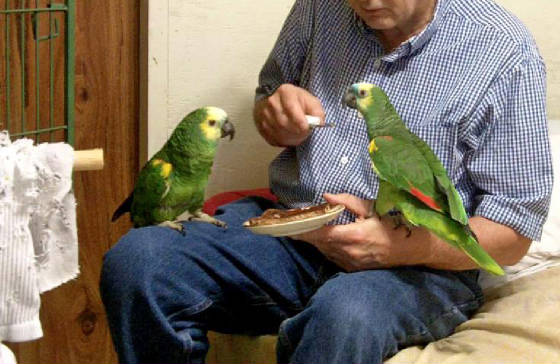
|
| ZIGGY (ON THE LEFT) WITH HIS NEW COMPANION, BUDDY |
| WATCHING WEATHERMAN ED BRANDON |
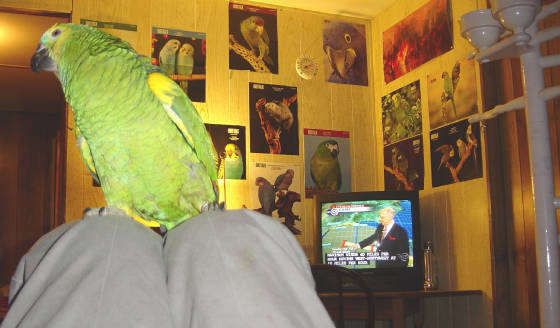
|
| NOTE ZIGGY'S "PIN-UPS" ON THE WALL |
|
 |

Get Facebook Buttons
|
|
 |
 |
 |
 |
|
| GETTING READY FOR A NIGHT-NIGHT NAP |
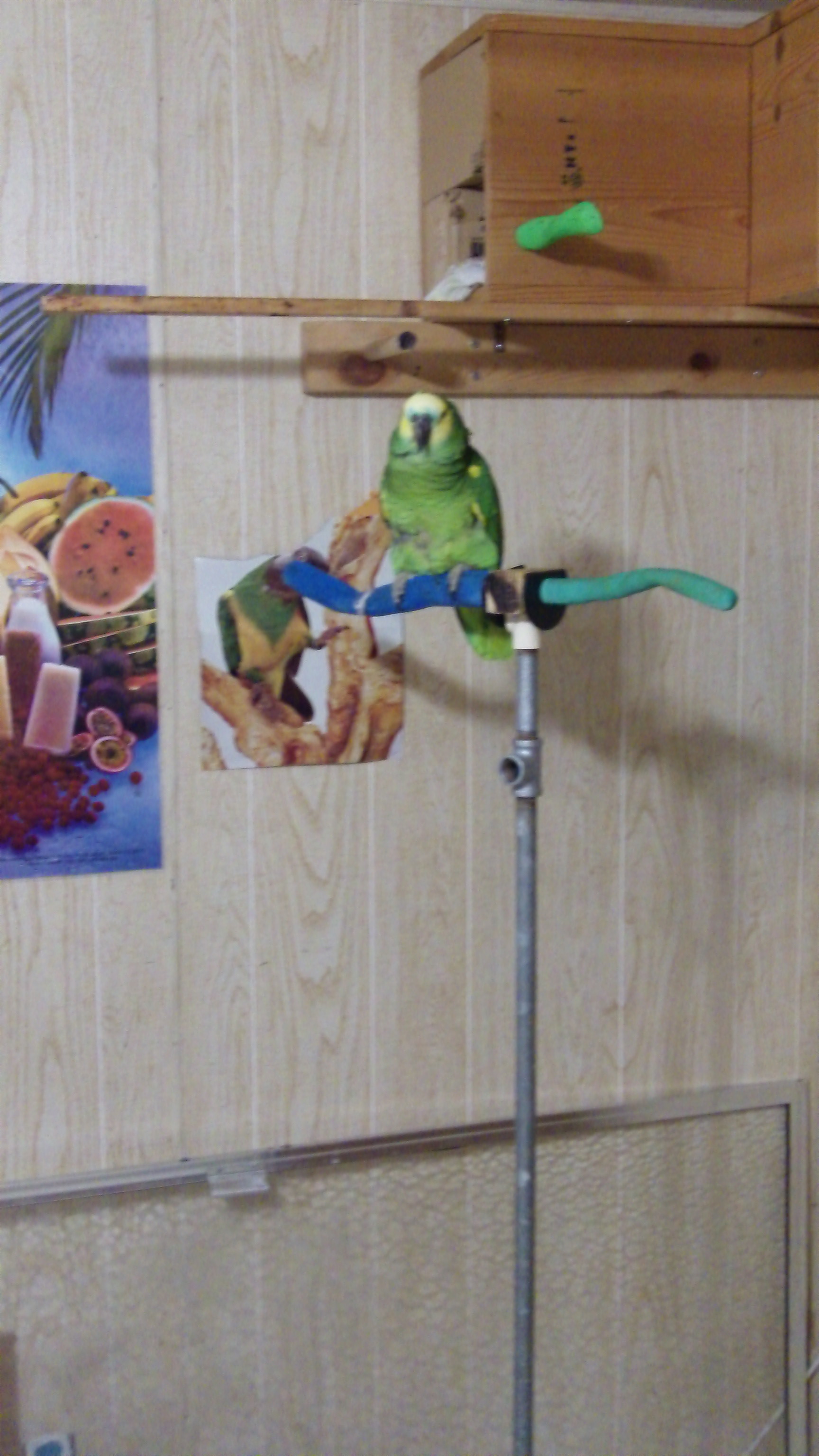
|
| We don't use that kind of plastic perch anymore, so don't use them |
MORE ABOUT ZIGGY:
Ziggy was wild-caught--i.e., birdnapped. He was torn
from his flock and family, transported to a USDA-regulated quarantine station, and then taken to a now-defunct Houston
pet store, Tropical Treasures, where he was put on sale. The letter code on his quarantine band is LGH, denoting
a Louisiana station. The numeric portion of the code is related to his quarantine date, but the USDA
has disposed of its old records and is unable to interpret that code for me.
These days, we know to oppose the trade in wild-caught birds, not
just because of its impact on wild bird populations, but because of the conditions under which that trade operates.
HELP PROTECT WILD PARROTS: visit and support the World Parrot
Trust, www.parrots.org: their name says it all.
At the time my mother purchased Ziggy, public awareness of the wild-caught
bird trade issue was not widespread. If you wanted a bird, you simply went to a pet store and bought one. The
thought never occurred to most people that the process by which these birds were often captured could have been so
nightmarish as to be unconscionable to a civilized being.
I believe we owe Ziggy and
all his wild-caught cousins a debt that can never be paid. As far as I am concerned, he should be treated
as an emperor--an emperor parrot!
Even though laws regulating the wild-caught bird trade are stricter these days, the market for such
birds still exists, the result being that now they get smuggled instead of being openly transported. Smuggled birds often die unimaginably horrible deaths because of the conditions under which they are
transported--perhaps drugged, or without food and water, or breathing only stale air. According to information
posted on their official website, U.S. Customs and Border Protection (CBP) agents "continue to find birds hidden inside plastic tubes, under car seats, in luggage and stuffed into cans
of baby formula....The illegal wildlife trade is a highly lucrative black market that ranks second in profits only to
illegal drug traffic. Not only does smuggling decrease the population of rare birds in the wild, it also increases the
chances that a communicable bird disease, such as Exotic Newcastle or Avian Influenza, could enter this country."
Obviously, there cannot be exact figures, but best estimates put the number of smuggled birds that
die before reaching their intended market at two out of three. The biosecurity threat to our nation is not just to wild
and domestic fowl, but to humans; there is scientific speculation that the presence of the West Nile virus in the Western
hemisphere may be due to bird smuggling (see birdfluebook.com.) Write your congressman to demand harsher penalties for
this crime.
The book, "Of Parrots and People," by Mira Tweti, has an excellent discussion of these (and other) injustices that have been--and sometimes continue
to be--perpetrated on our feathered parrot friends. Warning: the book contains some highly unsettling photos.
The cover blurb accurately describes the book as being about "The Sometimes Funny, Always Fascinating and Often Catastrophic
Collision of Two Intelligent Species."
For general news about parrots, visit FreeParrots.net. Mike Schindlinger, Harvard biologist, describes the site as "a meeting ground for rescue shelters,
animal welfare societies, and conservationists... and the people who share their concern and love for parrots." On
it are links that allow you to purchase his film, "Stalking the Wild Amazons," which has fantastic shots, including some from
inside the nests of wild parrots.
As far as Ziggy is concerned, though, what's done is done,
and I don't think he would have a good chance of survival in the wild now, even if he were among the "Wild Parrots of Telegraph Hill." Besides, he is pair-bonded to me now, and I do love him. I would like to get a female for him, but
I don't think it's as simple as buying a female parrot and putting them together, since they choose their own mates just
as we do. A "prearranged marriage" is not necessarily going to result in love at first sight. If you have any
suggestions about how to arrange for him to get a mate, please email me. I have emailed several parrot rescue organizations, but only one has responded (you'd think they'd
be eager to place one of their rescues with a parrot lover!) If I were a millionaire, I'd buy Ziggy an
aviary of blue-fronts, and let them pair up naturally.
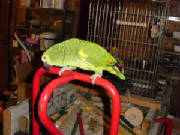
|
| ZIGGY ON "HIS" DOLLY |
Click here to visit brooklynparrots.com, a web site about the wild parrots of Brooklyn. Brooklynparrots.com kept us up to date and helped lead the
fight over the slaughter of wild parrots by Connecticut's electric company, United Illuminating, and, more
recently, about the attempt by the city of Barcelona, Spain, to eradicate its own wild parrots.
|
 |
|
UPDATE, 2009: Ziggy now has a companion. I had run out of his probiotic mix as well
as grey-striped sunflower seeds (an occasional treat), and did not have time to order online, so I visited a local aviary. Who
could resist looking at the birds while at an aviary? Lo and behold, I discovered a blue front there who tugged at my
heart strings: the birds were having to endure Houston's heat advisories (July, 2009) in a non-climate controlled environment,
and Buddy was so pathetic. To me, the place was a hell-hole; if I were a millionaire, I would have bought all of their
birds. The birds looked horribly stressed from the heat.
"Buddy" was sold to me as a female. Ziggy had lived for almost 20 years playing second fiddle
to my mother's first bird, also named Buddy, who had turned out, upon necropsy, to be a female. The coincidence
of the same wrongly-sexed name was too spooky for me: it seemed as though I were meant to get Buddy. In August,
2009, my vet informed me that "Buddy" is actually male (by DNA.)
I could not get any definitive information from the aviary about the new Buddy, but they did tell
me that the original owner had gotten rid of him AFTER HAVING HAD THE BIRD ALMOST 20 YEARS because he could not tolerate a
newly-acquired African grey and attacked it. (I could sympathize with Buddy; Greys are obnoxiously intelligent.) The
aviary people indicated that there "may" have been other "issues." I could not even get a medical record, but I felt
so sorry for the bird that I had to rescue him.
Buddy is a precious little nipper who keeps trying to make baby blue-fronts with me.
The very first time I did the obligatory neck-scratching, he started to shiver and clucked like a chicken (the same way
Ziggy does when he tries to engender a species of half perch/half parrot, or half food cup/half parrot.)
Now, two and a half years later, Buddy has gotten much more aggressive. He thinks he is king of
the world, and will tolerate no other parrots in his territory. In order to avoid parrot bloodshed, I'm having to cage him
if I leave the room for more than a minute or two. The only alternative is to have them out in separate rooms. There
is one place where Ziggy is safe when they're both out with me gone, but that's an upper corner in the room near the
ceiling, where, before I knew that you weren't "supposed" to do such things, I had installed a home-made nest box. Even Mr.
Ruler-of-the-universe-Buddy knows that that is off limits.
Buddy is incredibly clever. They can both be out, and I'll be alternately feeding each of them
some kind of treat, and Buddy will take the first opportunity to run off Ziggy (who is much larger, but a little more
frail) if I let my attention lapse. If my arm or hand gets in the middle, then his deadly beak will let me know I'm not
supposed to interfere with his mission. Other than that, he is as sweet as could be (not as amorous as Ziggy, though.)
They are both out together most of the time, and I am working on trying to resolve Buddy's "issues"
with other birds. I started out trying to get them to share the dinner table; my premise was that the birds wouldn't
be able to kill each other if their beaks were full of food, and it's not too difficult for me to come up with healthy food
that parrots go crazy for: they both love my cooking.
THE VET SAYS YOU'RE SUPPOSED TO FEED PELLETS TO YOUR PARROT, BUT YOUR BIRD WON'T
TOUCH THEM. YOUR BIRD ONLY WANTS "PEOPLE FOOD"--WHAT CAN YOU DO? PARROTS ARE NOT HOMO SAPIENS: ALTHOUGH
WE ARE BOTH OMNIVORES, OUR DIETARY REQUIREMENTS ARE NOT THE SAME. ALTHOUGH "PEOPLE FOOD" MAY NOT BE GOOD FOR THEM, ON THE
OTHER HAND, PELLETS ARE NOT A PANACEA. THE PELLET ISSUE HAS ALWAYS SPARKED LIVELY DEBATES WITHIN THE BIRD COMMUNITY.
I DISCUSS THAT AT DIETARY CONSIDERATIONS. FOR HEALTHY RECIPES AND IDEAS ON KEEPING BOTH YOU AND YOUR BIRD HEALTHY, VISIT COOKING FOR THE TWO OF US.
IF YOU SEE ANY TYPOS OR IF YOU NOTICE ANYTHING THAT YOU THINK IS AMBIGUOUS
OR MISLEADING, OR IF IT JUST NEEDS REWORDING, FEEL FREE TO EMAIL ME. FEEL FREE TO DO THE SAME IF YOU HAVE ANY ISSUES WITH OR SUGGESTIONS REGARDING THE FORMAT OF THIS WEB
SITE. ALL SERIOUS SUGGESTIONS ARE TAKEN UNDER ADVISEMENT.
|
 |
|
|
|
 |
 |
 |
 |
|



